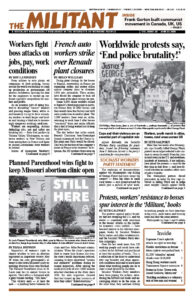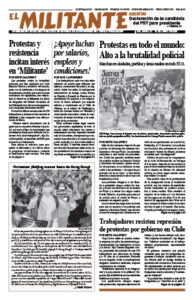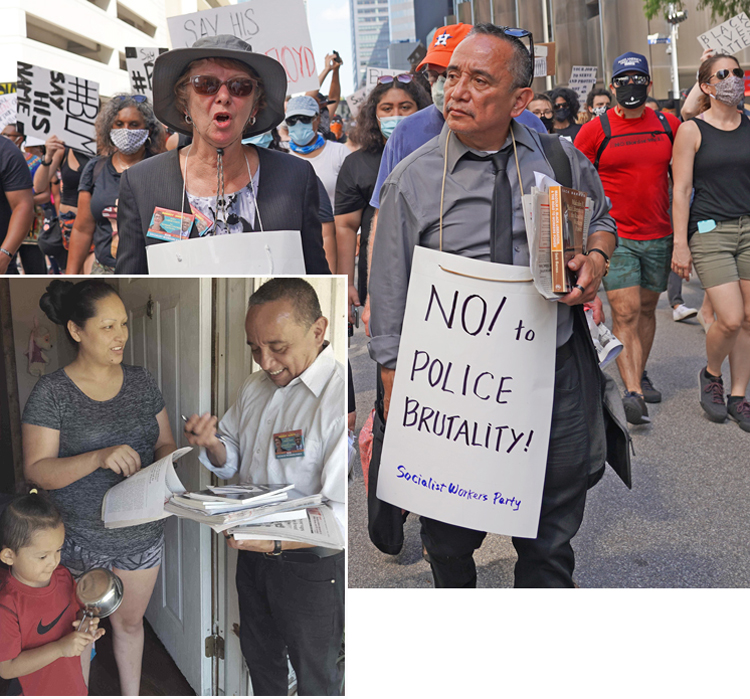The protests against police brutality that are sweeping the U.S. and the world — combined with resistance to the bosses’ attacks as the capitalist economic crisis unfolds — have boosted interest in the Militant newspaper, books by Socialist Workers Party leaders and other revolutionists, and the Socialist Workers Party election campaigns.
Over the last week more than 250 working people and youth have subscribed to the Militant and purchased at least that number of books. This is a reflection of the thirst to understand why cop brutality and other oppressive conditions exist and to learn more about what working people can do to chart a road forward to end them.
Socialist Workers Party members have been joining the actions, introducing the Militant and books and encouraging others to do the same. At the same time, they continue talking to working people on their doorsteps in big cities, small towns and farming areas and find the same interest.
Participants in June 5 and 6 rallies in Louisville, Kentucky, calling for prosecution of the cops who killed Breonna Taylor, bought 20 subscriptions to the Militant and 17 books.
At one protest SWP member Jacquie Henderson showed union carpenter William Martin the article written in 1866 by Karl Marx in the book Tribunes of the People and the Trade Unions. Marx wrote that the unions “must convince the world at large that their efforts, far from being narrow and selfish, aim at the emancipation of the downtrodden millions.”
“That’s what I’m talking about!” said Martin. He subscribed and purchased the book along with The Turn to Industry: Forging a Proletarian Party by Jack Barnes, national secretary of the Socialist Workers Party. In that title Barnes describes “the working-class program, composition and course of conduct” of the party, and why its members strive to join the struggles against the bosses’ attacks on our wages and working conditions today at the places where they work.
In New York City, participants in demonstrations purchased some 30 subscriptions to the Militant and well over 30 books, including The Jewish Question by Abram Leon, a vital account of the causes of Jew-hatred in the imperialist epoch; titles by leaders of the Cuban Revolution; and numerous books of speeches by Malcolm X.
Reform the cops?
“We’ve been discussing and debating with people whether the police can be reformed, what kind of movement we need to build to defend the interests of the working class,” David Rosenfeld, Socialist Workers Party candidate for U.S. Senate in Minnesota, told the Militant June 8. He has participated in many protests in the Twin Cities since George Floyd was killed.
Rosenfeld explains it’s possible to push back police brutality by winning indictments and prosecutions. But the only way to put an end to their brutality once and for all is for the working class to replace capitalist rule with a workers and farmers government.
“In the last week we’ve sold 24 subscriptions and 47 books,” he said, “mostly at literature tables we’ve set up near the memorial site for George Floyd.”
Strength in numbers
“Our strength is in our numbers,” Demartin Taylor told Alyson Kennedy and Malcolm Jarrett, the SWP candidates for U.S. president and vice president, at the June 8 viewing for George Floyd in his hometown of Houston.
Taylor was impressed with the participation of working people and youth of many different nationalities. “There are many races out here today,” he said. “This shows we can make a difference.”
The SWP candidates showed Taylor the book Malcolm X, Black Liberation, and the Road to Workers Power. It describes how the entire working class was strengthened by the explosive rise of the fight for Black liberation from the mid-1950s, and why the conquest of power by the working class will make the final battle for Black freedom possible. Taylor got the book and a subscription.
While Kennedy and Jarrett were campaigning on doorsteps in rural West Texas a few days before, workers they met told them about protests that took place in several small towns in the area.
Christine Oles in Weatherford told Kennedy she had been falsely arrested by cops twice in Dallas. “The police thought I had been drinking, even though I told them I have a disease that makes it hard for me to walk,” she said. “They wouldn’t listen and refused to give me a breathalyzer test.”
Oles subscribed to the Militant and purchased Red Zone: Cuba and the Battle Against Ebola in West Africa and Are They Rich Because They’re Smart?
Campaigning in Vermont
During the first week of June, SWP vice presidential candidate Jarrett campaigned in Vermont, where the SWP’s presidential ticket will be on the ballot.
“I am fed up with both parties in Washington,” Chris Brezizicki, a baker in Barre, told Jarrett.
In Rutland, Jarrett and Jacob Perasso, SWP candidate for Congress in New York’s 21st District, met Paul Plouffe, one of just 10 remaining small dairy farmers in the Champlain Valley. The big milk-processing companies, banks and feed suppliers, combined with government regulations that favor the big capitalist dairies, are driving many working farmers out of business.
“I need a price between $26 and $30 per hundred weight to meet my costs,” Plouffe said, explaining he is only getting $15. “Prices have been too low for five years.” At the same time the prices of seed and other inputs have gone up.
“Our campaign calls for an end to farm foreclosures,” Perasso said. “And demands a price guarantee for small farmers to ensure enough income to cover costs.”
“In Cuba they made a socialist revolution,” Jarrett said, “and one of their first acts was guaranteeing farmers would not lose their land, in addition to distributing land from the largest landholders to those who wanted to farm.”
“People will fight when they are pushed over the edge,” Plouffe said. “Fifteen small farmers getting together could begin to have an impact.”
To join the ongoing effort to introduce workers and youth to the Militant and books on revolutionary program and history, contact distributors nearest you.


